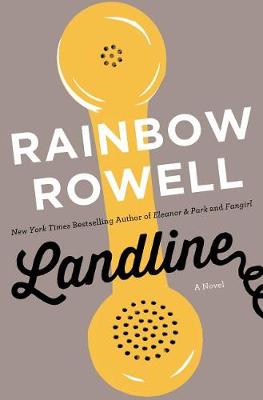Reviewed by girlinthepages on
Landline focuses on Georgie, a television writer, and Neal, a stay at home dad, and their current relationship which started fourteen years prior in college. Georgie realizes that despite her and Neal being deeply in love with each other, it’s possible that their relationship may be damaged beyond repair as the dynamics of children, careers, in laws and distance all take their toll over time. While separated from her family over the Christmas holiday, Georgie encounters her old yellow rotary phone from high school and finds when she calls Neal’s childhood home’s landline, she is able to speak with that fourteen year younger version of her husband, and is thus faced with hard decisions: Should she do something differently to make her marriage better? To prevent her marriage at all? Is she in a Back to the Future scenario in which her daughters are going to spontaneously disappear if she makes the wrong move? Is she actually insane?
Watching Georgie go through her internal struggle is what makes this book so interesting. Rowell builds Georgie’s relationships so interestingly, and her relationships with all the characters, from her too-young mother to her teenage half sister to her best friend Seth are all nuanced and quirky, and thus achingly realistic. A lot of the book is comprised of dialogue (no surprise with the focus being on a phone) and while for some readers the dialogue heavy/action light narrative may be too slow for their enjoyment, I thought it really showed Rowell’s skills. She can build a gripping story off of human conversations, emotions, and intimate conflict without having to resort to hugely drama-filled scenarios. I really felt as though I knew Georgie as a protagonist, and in some ways the book read like a character study for this smart and driven woman who’s history is revealed through self reflection, flashbacks, phone calls, and the reminiscing of close friends and families. It made me, as a reader, feel invested in Georgie’s marriage and in turn invested in the book.
As usual, Rowell charms with her plethora of pop culture references, especially in this book when Georgie and her best friend are tv writers. Everything from Metallica to Harry Potter to Gossip Girl is referenced in such a natural way that readers will get excited when they see it on the page and laugh aloud and agree with the characters reminiscing on these well-known icons in media.
One complaint that readers may have is while this book is a great display of Rowell’s talent in writing fantastically relateable and engaging characters, there are quite a bit of questions that go unanswered. There is really never ever explanation for the functioning of the yellow phone that allows Georgie to speak to Neal in the past, and never a concrete discussion or confirmation between the two about the conversations that transpired, so readers will need to be ok with never really knowing the mechanics (or the validity) of Georgie’s ability to talk to Neal in the past (was it her older self the whole time? Was she always filling in for her college self during those phone calls? Did they originally go differently? Agh, time travel stuff gets so confusing!)
Favorite Quote: “You don’t know when you’re twenty-three. You don’t know what it really means to crawl into someone else's life and stay there.” -pg 201
Overall: Landline is a fantastic novel for those who appreciate Rowell’s talent in writing nuanced characters and who love her knack for integrating pop culture references. It may have been a “slower” book in terms of less action and lots of dialogue, but essentially it’s a book about Georgie’s reflection on her own choices, her love for Neal, and her marriage, and how much a factor is love when other life decisions and ambitions force their way between you and your partner. While readers who need concrete closure may not like the ending of Landline, I found it to be a really realistic portrayal of fixing and healing a marriage- a process that may never have complete “closure” as couples work on their marriage one day at a time.
Reading updates
- Started reading
- 12 October, 2014: Finished reading
- 12 October, 2014: Reviewed
